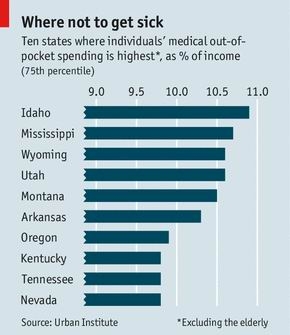Health reform
Mississippi spurning
Obamacare hits trouble in the states
Jul 13th 2013 | JACKSON, MISSISSIPPI
2013年7月13日

BARACK OBAMA’S health reform was supposed to bring universal health coverage to America on January 1st, 2014. It won’t. To understand why, consider states such as Mississippi.
奧巴馬的醫療改革原本預計從2014年1月1日開始實施,大范圍的美國人將享受醫保待遇,但事實上事與愿違。為什么?讓我們以密西西比州為例一探究竟。
Terry Brown, a Republican state senator there, stood before his colleagues on June 28th, as they lounged in summer poplin and seersucker. They had assembled to decide whether Mississippi would expand Medicaid, the public health program for the poor, as Obamacare urges. That day Mississippi said it would not. “I don’t want Mississippi to be a part of that train wreck,” said Mr Brown.
泰瑞·布朗,是一名共和黨議員,6月28日那天他帶領他的同僚聚在一起,商討密西西比是否要擴大醫保范圍。此舉,用奧巴馬的話講,是惠及廣大貧困群眾的公共醫療項目。但當天密西西比就表示不會實施新醫保。“我不想密西西比受到新醫保的牽連而蒙受損失”布朗說。
Obamacare aims to extend insurance to the poor in two main ways, both starting in 2014. First, it required states to offer Medicaid to all those with incomes of up to 138% of the federal poverty level, or $15,856 for an individual. (At present Medicaid must cover only some poor people, such as pregnant women.) The federal government and the states usually share the cost of Medicaid. But Obamacare would pay for the expansion through 2016, with the feds’ share falling to 90% in 2020.
奧巴馬的醫療改革,旨在從2014年開始使醫保覆蓋到廣大貧困群眾,主要通過兩項政策實現。政策一,對于收入不高于聯邦貧困線38%的人員,或者個人收入不高于15,856美金的人員,州政府需要為他們提供醫保(目前的醫保只覆蓋到部分貧困人群,例如懷孕婦女)。聯邦政府和州政府一般共同提供醫保資金,但是奧巴馬的醫保普及政策是2016年之前聯邦政府會支付新醫保的費用,2020年支付90%的費用,其余由州政府承擔。
Second, individuals would be able to shop for insurance on new state-based markets, called health exchanges. Those with incomes between 100% and 400% of the federal poverty level would qualify for federal subsidies.
政策二,今后個人可從州政府主導的醫療保險交易所購買保險。個人收入在聯邦貧困標準及其4倍之間的人群才有資格申請聯邦補貼。
Neither provision is going as planned. Last year the Supreme Court made the Medicaid expansion optional. At least 21 states say they will opt out. Even more are refusing to set up their own exchanges, leaving the task to federal bureaucrats.
不管是以上哪條新政,估計都要擱淺了。去年最高法院宣布此次醫療普及政策并非強制執行。至少有21個州宣布他們不會參與其中。甚至多數拒絕建立各自的醫療保險交易所,將這一難題留給聯邦政府處理。
Mississippi would seem the ideal place to cover more poor people. It is America’s poorest state and has the shortest life expectancy. Its current Medicaid programme is among America’s least generous. Mississippians devote an unusually large share of their income to health care (see chart). One resident in five is uninsured.
作為美國最貧窮以及居民壽命最短的州,密西西比看上去是此次醫療改革的理想試點。它現有的醫保計劃位列全美最不惠民的政策之一,盡管出人意外地,它的大部分政府收入用于醫保支出,(見圖表),但兩成居民都不能享受醫保。
But Obamacare’s main provisions have gone nowhere in the Magnolia State. The fight over the Medicaid expansion involved hair-raising brinkmanship. Had lawmakers not voted before July 1st, the state’s entire Medicaid programme would have stopped functioning. Republicans insisted an expansion was unaffordable. State Medicaid costs would have increased by 7% from 2013 to 2022, estimates the Urban Institute, a think-tank. That is much less than the expected 30% increase in Medicaid subsidies from the central government. But the 7% rise would have been bigger than in any other state, mostly because Mississippi’s current Medicaid programme is so skimpy.
但是奧巴馬的醫療保障政策在馬格諾利亞州卻悄無聲息。為了抵抗醫保普及政策,反對者不惜鋌而走險。要不是立法機關7月1日前沒有進行投票表決,不然馬格諾利亞的全部醫保計劃都將暫停。共和黨人堅稱州政府根本支付不起醫保普及政策。據智囊團“城市研究所”預估,若新醫保從2013年開始實施,密西西比州政府因此承擔的醫保資金到2022年要增加7%。而中央政府的醫保補貼預計要增加三成。而其他州的的資金投入增幅遠遠不及7%,主要是因為密西西比目前的基數太小了。
The fight over the state’s exchanges was equally bareknuckle. Mississippi’s elected insurance commissioner wanted a state-based exchange. The Republican governor, Phil Bryant, wanted nothing to do with Obamacare. After a messy spat, plans for a state exchange dissolved. By default, Mississippi will have a “federally facilitated exchange”, managed by the health secretary’s deputies. So far only two insurers have made bids to sell health plans on it. Residents of 42 counties will have a choice of only one subsidised plan; 36 counties will have none. And many poor Mississippians will be ineligible for Medicaid.
對于另一條醫保交易政策,反對的聲音同樣激烈堅決。在密西西比,推舉出的醫保代理機構希望醫保交易所是由州政府主導的。但是州長費勒·布萊恩特是共和黨人,不想參與奧巴馬的新醫保。經過一番舌戰,政府主導的醫保交易計劃也擱淺了。大家心照不宣,密西西比的醫保交易所將由“聯邦政府輔助引導”,由衛生部的副秘書長們管理。至此只有兩家保險公司競價參與醫保計劃。42個郡的居民將可以選擇性的享受一項醫療補貼計劃,也是唯一的一項;另外36個郡將不參與。另外還有許多人將無權享受醫保。
Stansel Harvey is the boss of the Delta Regional Medical Centre, in the heart of old cotton country. The Mississippi Delta contains some of America’s poorest counties. About 10% of Mr Harvey’s patients fail to pay their bills. The insurance expansion would have made many of them paying customers. Crucially, that new revenue would have helped offset another Obamacare change: lower payment rates to hospitals. Without new insurance revenue, Mr Harvey reckons that he may need to cut services. If other hospitals follow suit, Mississippians will have a problem. In the age of Obamacare, they may have less access to health care, not more.
斯坦索爾·哈雷,是位于科頓郡中心的德爾塔醫療中心的老板。很多美國最窮的郡就位于密西西比河三角洲。在哈雷的醫療中心看病的病人中,大約一成都無法支付醫療費用。醫保普及后他們中的許多人將看得起病。重要的是,因此受益的醫院收入將增加,這將抵消奧巴馬醫改帶來的另外一個變化:醫院的繳費率將下降。如果沒有新醫保帶來的增收,哈雷說他可能不得不關門大吉。如果其他的醫院也紛紛歇業,密西西比將面臨一個新問題。奧巴馬醫改之下,盡管醫保覆蓋范圍廣了,但是人民可以看病的地方也少了。











